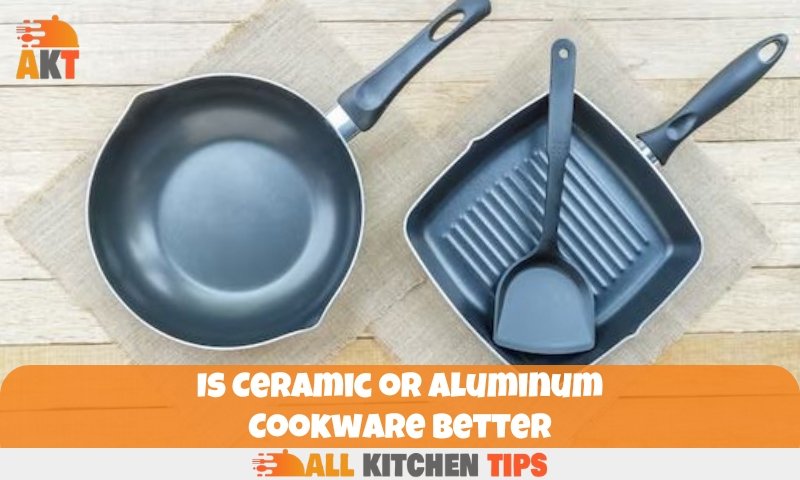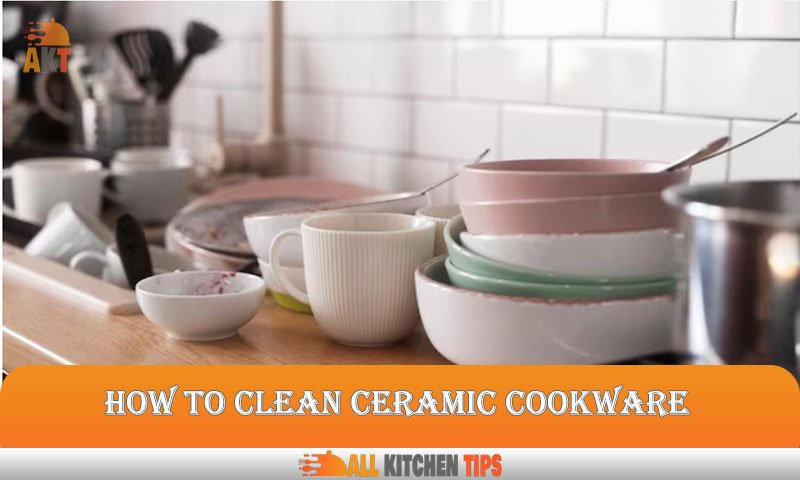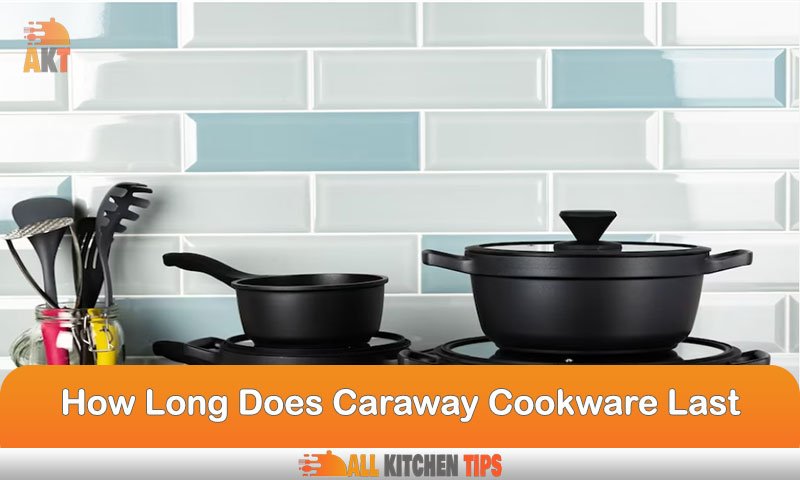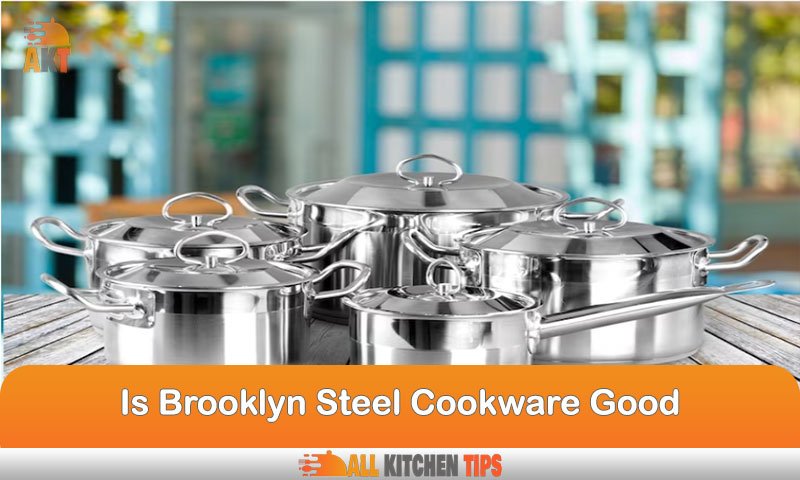Ceramic cookware is better than aluminum cookware because it is non-stick, scratch-resistant, and non-reactive with acidic foods. Ceramic and aluminum are two popular materials used for cookware, but which is better?
Ceramic cookware is made from a clay mixture and coated with a non-stick surface, while aluminum cookware is made from a type of metal that conducts heat well. Both have their pros and cons, but ceramic cookware has more benefits.
It is non-reactive with acidic foods, meaning it won’t leach harmful chemicals into your food. It is also scratch-resistant and non-stick, making it easy to cook and clean. Aluminum cookware, on the other hand, is lightweight and affordable but can react with certain foods and scratch easily. Overall, ceramic cookware is the better choice for health-conscious and busy individuals.
Finding The Perfect Cookware For Your Kitchen
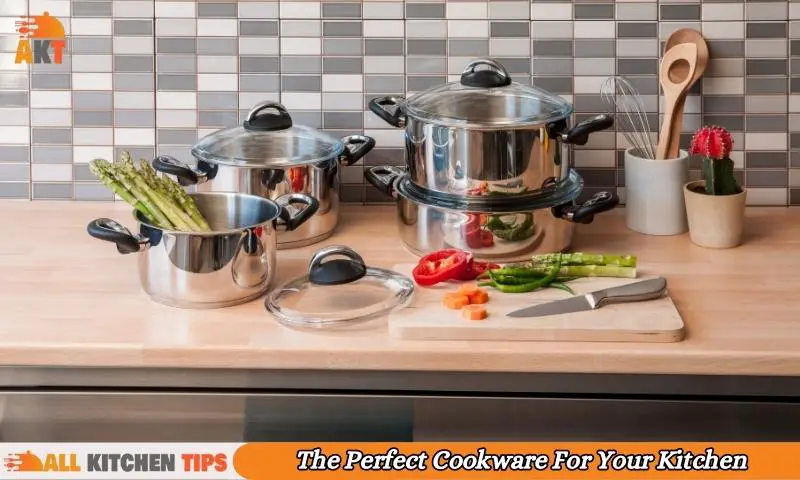
Is Ceramic Or Aluminum Cookware Better? Finding The Perfect Cookware For Your Kitchen
When it comes to cookware, there are a variety of options available. However, the two most popular materials are ceramic and aluminum. Both have their unique benefits and drawbacks. You need to consider your cooking style, budget, and health concerns before making a decision.
We will discuss the differences between ceramic and aluminum cookware. So let’s dive in!
Benefits Of Investing In Quality Cookware
Investing in quality cookware can make a huge difference in your cooking experience. Here are some of the benefits of investing in quality cookware:
- Durability: Investing in quality cookware can save you money in the long run. High-quality cookware is more durable and can last for years with proper care.
- Even heat distribution: Quality cookware provides even heat distribution, which is vital for precise cooking.
- Better cooking results: Good quality cookware can improve the taste and texture of your dishes and prevent them from sticking.
- Health benefits: Quality cookware is often made of safe materials, like non-toxic ceramic and non-reactive stainless steel, and is free of harmful chemicals.
Understanding The Differences Between Ceramic And Aluminum Cookware
Both ceramic and aluminum cookware have their pros and cons. It is important to understand the differences between the two to make an informed decision.
Ceramic Cookware
Pros:
- Non-toxic: Ceramic cookware is made of natural materials and does not contain harmful chemicals.
- Non-stick: Ceramic cookware has a non-stick surface, preventing food from sticking and making it easier to clean.
- Heat retention: Ceramic cookware retains heat well, allowing for evenly cooked dishes.
Cons:
- Poor heat conductivity: Ceramic cookware has poor heat conductivity, which leads to uneven heating.
- Fragile: Ceramic cookware can be fragile and prone to cracking or chipping if not handled with care.
- Limited cooktop compatibility: Ceramic cookware is not recommended for use on high-heat flames, such as gas stovetops.
Aluminum Cookware
Pros:
- Good heat conductivity: Aluminum cookware has excellent heat conductivity, providing even and quick heating.
- Lightweight: Aluminum cookware is lightweight and easy to handle.
- Affordable: Aluminum cookware is generally more affordable than other types of cookware.
Cons:
- Reactive: Aluminum can react with acidic foods and create a metallic taste.
- Prone to scratches: Aluminum cookware can scratch easily and is not as durable as other materials.
- Discoloration: Aluminum cookware has a tendency to discolor over time and with frequent use.
Both ceramic and aluminum cookware have their benefits and drawbacks. It is best to assess your needs and budget to find the cookware that suits you best. Remember to always look for quality cookware that is safe, durable, and provides even heat distribution.
Discover The Ultimate Cookware: Ceramic vs Aluminum
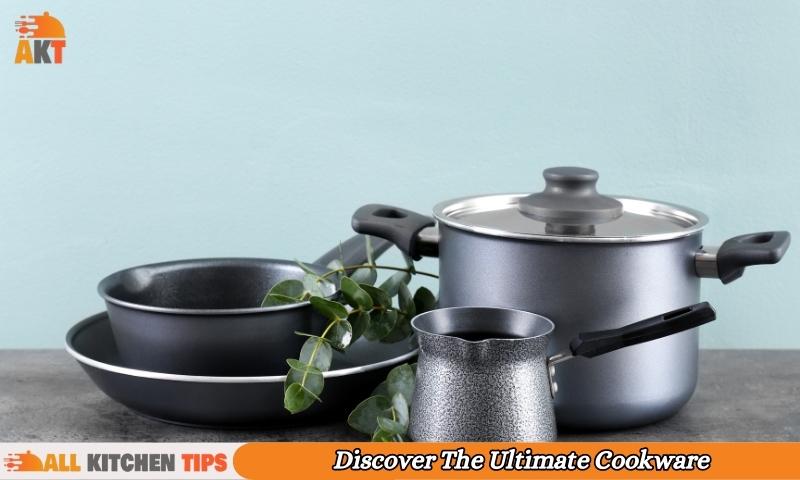
Are you in the market for new cookware but unsure whether to choose ceramic or aluminum? The decision can be tough, with both materials having their pros and cons. In this post, we’ll take a look at the main characteristics of each type of cookware to help you make an informed choice.
What Is Ceramic Cookware?
Ceramic cookware is made from natural clay that is fired at high temperatures to create a hard, non-stick surface. Here are some key points to keep in mind when considering ceramic cookware:
- Ceramic cookware is non-toxic and free of chemicals, making it a safe option for cooking.
- It distributes heat evenly, ensuring that your food is cooked thoroughly.
- It is easy to clean and maintain due to its non-stick surface.
- Ceramic cookware comes in a range of stylish designs to suit any kitchen.
Benefits Of Using Ceramic Cookware
Ceramic cookware has numerous benefits that make it a popular choice among home cooks. Here are some of the biggest advantages:
- Ceramic cookware is completely free of chemicals and toxins, making it a healthier option than some other materials.
- It is highly durable and resistant to scratches, making it long-lasting.
- Ceramic cookware heats up quickly and evenly, reducing the chance of undercooked or overcooked food.
- It is easy to clean and maintain, requiring only mild soap and water.
- Ceramic cookware is versatile and can be used on various heat sources, such as gas, electric, and induction cooktops.
How To Care For Your Ceramic Cookware
To get the most out of your ceramic cookware, it’s important to care for it properly. Here are some tips:
- Avoid using metal utensils, which can scratch the non-stick surface. Instead, use silicone, wooden, or plastic utensils.
- Don’t use high heat settings, as this can damage the cookware and cause it to degrade over time.
- Hand wash your ceramic cookware with mild soap and water. Don’t put it in the dishwasher, as the harsh chemicals can damage the non-stick surface.
- Store your ceramic cookware carefully to avoid scratches or chips.
Drawbacks Of Ceramic Cookware
While ceramic cookware has numerous benefits, it also has some drawbacks. Here are a few things to keep in mind:
- Ceramic cookware can be expensive compared to other materials.
- It is not as durable as some other materials, such as cast iron.
- Ceramic cookware can become damaged if exposed to high heat or sudden temperature changes.
- The non-stick surface can wear down over time, which may require replacement.
Aluminum Cookware: Features, Benefits, And Drawbacks
What Is Aluminum Cookware?
Aluminum cookware is a popular type of cookware due to its efficient heat conductivity. The material’s high thermal conductivity makes aluminum cookware a time-saving and efficient choice for cooking. It is also one of the most affordable materials used in cookware.
Benefits Of Using Aluminum Cookware
Lightweight:
Aluminum cookware is lightweight and easy to handle, making it perfect for everyday use.
Even Heat Distribution:
Aluminum cookware has excellent heat distribution, ensuring that food is cooked evenly and consistently. It also heats up quickly, reducing cooking times.
Affordable:
Aluminum is a relatively inexpensive material compared to other options, making it an affordable choice for beginners.
Easy To Clean:
Aluminum’s non-stick surface makes cleaning a breeze. Most aluminum cookware is also dishwasher safe.
How To Care For Your Aluminum Cookware
Hand Wash:
Avoid putting aluminum cookware in the dishwasher, as it can cause it to oxidize and tarnish. Hand wash using warm soapy water, and avoid using abrasive cleaners or scrubbers that can scratch the surface.
Avoid High Heat:
Aluminum cookware should not be subjected to high heat, as it can warp or melt. Use medium to low heat and avoid leaving an empty pot or pan on the stove.
Use Wood Or Silicone Utensils:
To prevent scratching the surface, use wooden or silicone utensils when cooking with aluminum cookware.
Drawbacks Of Aluminum Cookware
Reactivity:
Aluminum cookware can react with acidic foods and leach aluminum into the food. This can alter the taste and texture of the food. To prevent this, it is best to use coated aluminum cookware or avoid cooking acidic foods in it.
Durability:
Aluminum cookware can easily scratch or dent, reducing its lifespan. It is not recommended for use with metal utensils or in a high-traffic kitchen, where it may experience more wear and tear.
Non-Induction Compatible:
Aluminum cookware is not magnetic, meaning it is not compatible with induction stovetops. If you have an induction stove, you would need to purchase a separate set of cookware.
Overall, aluminum cookware is an affordable and efficient option for everyday cooking. However, it may not be suitable for everyone due to its reactivity and durability issues. With proper care and use, aluminum cookware can provide many years of use in the kitchen.
Choosing The Right Cookware For Your Kitchen Needs
Cookware is a crucial part of any kitchen, whether you’re a professional chef or a home cook. One of the critical decisions you need to make when buying cookware is choosing between ceramic and aluminum. In this section, we’ll explore the key factors you need to consider before making your choice.
Durability And Longevity
Cookware sets that are durable and long-lasting can save you money and ensure that you cook with ease and comfort. Here are the key points to consider when it comes to durability and longevity in ceramic and aluminum cookware:
- Ceramic cookware is made from natural materials and can last for an extended period if used and cared for correctly.
- Aluminum cookware is also durable but may show signs of wear and tear over time and may not last as long as ceramic cookware.
- Some ceramics are prone to chipping, but this can be avoided by choosing high-quality ceramic cookware.
Heat Distribution And Capacity
The ability of cookware to distribute heat evenly is critical to ensuring that your food cooks evenly. Capacity also matters, especially if you’re cooking for a large group. Here are the key points to consider regarding heat distribution and capacity when it comes to ceramic and aluminum cookware:
- Ceramic cookware distributes heat evenly, ensuring that your food cooks evenly.
- Aluminum cookware also distributes heat evenly, but it heats up faster than ceramic, making it a better option for cooking time-sensitive foods.
- Aluminum cookware comes in a range of sizes, making it ideal for cooking large quantities of food.
- Ceramic cookware is available in different sizes but may be more suitable for smaller meals and dishes.
Safe For Healthy Cooking
The safety of the cookware you use can impact your health. It is crucial to consider whether ceramic or aluminum cookware is safe for healthy cooking. Here are the key points to consider:
- Ceramic cookware is made from natural materials and does not contain harmful chemicals like PFOA and PTFE, which may be present in some non-stick coatings.
- Aluminum cookware may have a non-stick coating that contains PFOA and PTFE, which can be harmful if consumed.
- To ensure healthy cooking, choose high-quality ceramic and aluminum cookware without non-stick coatings.
Maintenance And Cleaning
Maintenance and cleaning are essential to extending the lifespan of your cookware and keeping it in perfect condition. Here are the key points to consider regarding maintenance and cleaning:
- Ceramic cookware is easy to clean and can be rinsed with warm water and mild soap, but it can be challenging to remove stains.
- Aluminum cookware is dishwasher safe, making it easy to clean, but it may be prone to discoloration and stains over time.
- It is recommended to hand-wash both ceramic and aluminum cookware to avoid damage to the surface and make it last longer.
Comparison Of Pricing
Pricing is an essential factor for many when making a decision on which cookware to buy. Here are the key points to consider when it comes to pricing:
- Ceramic cookware is generally more expensive than aluminum cookware due to the higher cost of materials and the manufacturing process.
- Aluminum cookware is more affordable and readily available, making it a popular choice for many.
Both ceramic and aluminum cookware have their strengths and weaknesses. When considering what cookware to buy, you must determine your needs based on factors such as durability, heat distribution, safety, maintenance and cleaning, and pricing. Whatever your preference, ensuring that you select high-quality cookware is essential to ensuring that it lasts for years to come.
FAQs
Is Ceramic Cookware Safe To Use?
Yes, ceramic cookware is safe as long as it doesn’t have any toxic materials and is not scratched or damaged.
Which Is Better: Ceramic Or Aluminum Cookware?
Both have their advantages and disadvantages. Ceramics is non-reactive, but aluminum heats quickly and evenly.
How Do I Clean Ceramic Cookware?
Most ceramic cookware can be cleaned with mild soap and warm water. Avoid abrasive sponges and harsh cleaners to prevent scratching the surface.
Conclusion
After comparing the pros and cons of ceramic and aluminum cookware, it is safe to say that both are good choices, depending on your cooking needs and preferences. While ceramic cookware is known for its non-stick and easy-to-clean properties, aluminum cookware is valued for its heat conductivity and affordability.
Moreover, ceramic cookware is a safer option as it does not pose a risk of leaching chemicals into your food. However, aluminum cookware is more durable and can handle high heat better than ceramic. At the end of the day, the decision between ceramic and aluminum cookware boils down to your budget, cooking style, and personal preference.
It is advisable to choose cookware that meets your cooking needs and aligns with your health goals. With this information, you can confidently make an informed decision on the type of cookware to add to your kitchen.

